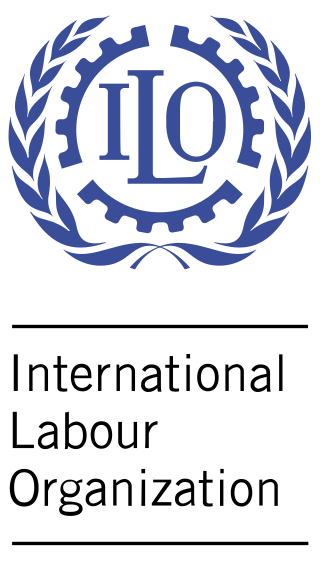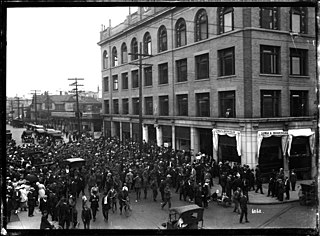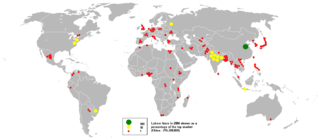Related Research Articles

The International Labour Organization (ILO) is a United Nations agency whose mandate is to advance social and economic justice by setting international labour standards. Founded in October 1919 under the League of Nations, it is the first and oldest specialised agency of the UN. The ILO has 187 member states: 186 out of 193 UN member states plus the Cook Islands. It is headquartered in Geneva, Switzerland, with around 40 field offices around the world, and employs some 3,381 staff across 107 nations, of whom 1,698 work in technical cooperation programmes and projects.
Labour laws are those that mediate the relationship between workers, employing entities, trade unions, and the government. Collective labour law relates to the tripartite relationship between employee, employer, and union.
Trade Unions in India are registered and file annual returns under the Trade Union Act (1926). Statistics on Trade Unions are collected annually by the Labour Bureau of the Ministry of Labour, Government of India. As per the latest data, released for 2012, there were 16,154 trade unions which had a combined membership of 9.18 million. The Trade Union movement in India is largely divided along political lines and follows a pre-Independence pattern of overlapping interactions between political parties and unions. The net result of this type of system is debated as it has both advantages and disadvantages. According to the data submitted by various trade unions to the Ministry of Labour and Employment as part of a survey, INTUC with a combined membership of 33.3 million, has emerged as the largest trade union in India as of 2013.
The Australian labour movement began in the early 19th century and since the late 19th century has included industrial and political wings. Trade unions in Australia may be organised on the basis of craft unionism, general unionism, or industrial unionism. Almost all unions in Australia are affiliated with the Australian Council of Trade Unions (ACTU), many of which have undergone a significant process of amalgamations, especially in the late 1980s and early 1990s. The leadership and membership of unions hold and have at other times held a wide range of political views, including communist, socialist and right-wing views.
Labor rights or workers' rights are both legal rights and human rights relating to labor relations between workers and employers. These rights are codified in national and international labor and employment law. In general, these rights influence working conditions in relations of employment. One of the most prominent is the right to freedom of association, otherwise known as the right to organize. Workers organized in trade unions exercise the right to collective bargaining to improve working conditions.

A strikebreaker is a person who works despite a strike. Strikebreakers are usually individuals who were not employed by the company before the trade union dispute but hired after or during the strike to keep the organization running. Strikebreakers may also refer to workers who cross picket lines to work.
The Organisation of African Trade Union Unity (OATUU) is an independent regional union federation aimed at unifying trade union centres in Africa. This organisation was founded in April, 1973 as a successor to two previously competing labour union organisations in Africa: the All-African Trade Union Federation (AATUF) and the African Trade Union Confederation (ATUC). The process to unify a Pan-African labour union organisation also involved international labour organisations as decision-making stakeholders like the International Confederation of Free Trade Unions (ICFTU) and the World Federation of Trade Unions (WFTU). Finally, also with the help of the Organisation of African Unity (OAU), the AATUF and the ATUC merged to form the OATUU. The driving factors for this unification and the creation of the OATUU was to advance Pan-Africanism, economic justice, and social justice throughout African workplaces.

The All-China Federation of Trade Unions (ACFTU) is the national trade union center of the People's Republic of China. It is the largest trade union in the world with 302 million members in 1,713,000 primary trade union organizations. The ACFTU is divided into 31 regional federations and 10 national industrial unions. The ACFTU is the country's sole legally mandated trade union, with which all enterprise-level trade unions must be affiliated. There has been dispute over whether ACFTU is an independent trade union or even a trade union at all. It directs a public college, the China University of Labor Relations.
The All Pakistan Federation of Labour (APFOL) is a national trade union centre in Pakistan. It was founded in 1951 by Rahmatullah Chaudhary.
The Pakistan Workers' Federation (PWF) is a national trade union centre in Pakistan. It is the largest labour organisation in the country and its affiliated unions are among the oldest. The centre itself was created in 1994 through a merger of three former national centres. It is independent and non-political. Internationally, it is affiliated with ITUC.
Trade unions in South Africa has a history dating back to the 1880s. From the beginning unions could be viewed as a reflection of the racial disunity of the country, with the earliest unions being predominantly for white workers. Through the turbulent years of 1948–1991 trade unions played an important part in developing political and economic resistance, and eventually were one of the driving forces in realising the transition to an inclusive democratic government.

Labor relations is a field of study that can have different meanings depending on the context in which it is used. In an international context, it is a subfield of labor history that studies the human relations with regard to work in its broadest sense and how this connects to questions of social inequality. It explicitly encompasses unregulated, historical, and non-Western forms of labor. Here, labor relations define "for or with whom one works and under what rules. These rules determine the type of work, type and amount of remuneration, working hours, degrees of physical and psychological strain, as well as the degree of freedom and autonomy associated with the work." More specifically in a North American and strictly modern context, labor relations is the study and practice of managing unionized employment situations. In academia, labor relations is frequently a sub-area within industrial relations, though scholars from many disciplines including economics, sociology, history, law, and political science also study labor unions and labor movements. In practice, labor relations is frequently a subarea within human resource management. Courses in labor relations typically cover labor history, labor law, union organizing, bargaining, contract administration, and important contemporary topics.
Trade unions in Laos have been active in the country since at least the mid-20th Century.

Ebrahim Patel is a South African cabinet minister, who holds the position of Minister of Trade, Industry and Competition. He previously served as Minister of Economic Development from 2009 to 2019.
The National Labour Federation (NLF) is national trade union centre in Pakistan. The trade union is the labour wing of the Jamaat-e-Islami party and organises workers in various sectors, including telecommunications, shipyards, transport and manufacturing. It is the third-largest trade union in Pakistan and is not affiliated with any international labour organisations.
International labour law is the body of rules spanning public and private international law which concern the rights and duties of employees, employers, trade unions and governments in regulating Work and the workplace. The International Labour Organization and the World Trade Organization have been the main international bodies involved in reforming labour markets. The International Monetary Fund and the World Bank have indirectly driven changes in labour policy by demanding structural adjustment conditions for receiving loans or grants. Issues regarding Conflict of laws arise, determined by national courts, when people work in more than one country, and supra-national bodies, particularly in the law of the European Union, has a growing body of rules regarding labour rights.
Trade unions in Pakistan are regulated under provincial industrial relations acts. Under the Constitution of Pakistan, labour is considered a shared responsibility of the federal and provincial governments. The latest Industrial Relation Act was promulgated on 12 March 2012 by President of Pakistan. National Industrial Relations Commission (NIRC) was established under Labour Policy, 1972 as a quasi-judicial authority to promote genuine trade unionism, setting up industry-wise federations of unions and at the national levels. According to NIRC, in 2016 there were 1,390 trade unions with registered 1.4 million members. There are 16 registered federations and the ratio of total union members to total employment is 2.2%.

Nepal has a labour force of 16.8-million-workers, the 37th largest in the world as of 2017. Although agriculture makes up only about 28 per cent of Nepal's GDP, it employs more than two-thirds of the workforce. Millions of men work as unskilled labourers in foreign countries, leaving the household, agriculture, and raising of children to women alone. Most of the working-age women are employed in agricultural sector, contributions to which are usually ignored or undervalued in official statistics. Few women who are employed in the formal sectors face discrimination and significant wage gap. Almost half of all children are economically active, half of which are child labourers. Millions of people, men, women and children of both sexes, are employed as bonded labourers, in slavery-like conditions. Trade unions have played a significant role in earning better working conditions and workers' rights, both at the company level and the national government level. Worker-friendly labour laws, endorsed by the labour unions as well as business owners, provide a framework for better working conditions and secure future for the employees, but their implementation is severely lacking in practice. Among the highly educated, there is a significant brain-drain, posing a significant hurdle in fulfilling the demand for skilled workforce in the country.
The Bangladesh Independent Garment Workers Union Federation (BIGUF) is a trade union federation of garment workers in Bangladesh. It is considered one of the four main federations of garment workers' unions. BIGUF is affiliated with the IndustriALL Global Union and a member organisation of the Bangladesh Center for Workers Solidarity. It is also one of the signatories of the Bangladesh Accord. Unlike many other trade unions in Bangladesh, it is explicitly not affiliated with any political party.
The Bangladesh Institute of Labour Studies (BILS) is a think tank for trade union activity and other labour matters in Bangladesh. It was founded in 1995 to support the building of trade unions and their activities and to promote trade union causes within government and society. Today, 12 Bangladeshi trade union federations are affiliated with BILS. Unlike many other labour organisations in Bangladesh, the institute is not affiliated with any political party. The institute publishes a biannual journal, Labour.
References
- ↑ Zakaullah Khan Khalil (2018). A Profile of Trade Unionism and Industrial Relations in Pakistan (PDF) (Report). International Labour Organization.
- 1 2 Pakistan Labour Movement (PDF) (Report). Labour Education Foundation.
- ↑ "Hyderabad: Curtailment of labour rights deplored". 2002-11-12.
- ↑ "Case No 2799 (Pakistan) - Complaint date: 20-MAY-10". ILO . 2010-05-10.
- ↑ Hussain Kashif (2010-11-12). "Labour unions criticises anti-labour articles in 18th Amendment".
- ↑ "State has no data of workers: Mazdoor leaders". 2020-03-31.